- Home
- Saul Tanpepper
Iceland: An International Thriller (The Flense Book 2)
Iceland: An International Thriller (The Flense Book 2) Read online
CONTENTS
ICELAND
Book 2 of THE FLENSE series
LOCKDOWN
(excerpt of a standalone story in the world of THE FLENSE)
‡ ‡ ‡
Care to share?
Copyright Notice
Acknowledgments
About the Author
Tanpepper Tidings Newsletter
(subscribe for exclusive access, pricing, giveaways and more)
‡ ‡ ‡
THE FLENSE
Contracted by a prepper group to investigate a series of seemingly disconnected global tragedies, a young freelance reporter, Angelique de l'Enfantine, uncovers a disturbing pattern: each event is preceded by the sudden spread of a mysterious ailment and is followed by the appearance of a man dressed in black and silver who witnesses claim is the devil himself. THE FLENSE is a 4-book international thriller series (also released as a 12-part serial) and companion to the post-apocalyptic series BUNKER 12.
by Saul Tanpepper
© 2016
All rights reserved (full notice)
This book is a work of fiction. Names, characters, places, and incidents either are the product of the author’s imagination or are used fictitiously.
[email protected]
(rv.160831)
Chapter One
June
KÁSOS STRAIT, SEA OF CRETE
MEDITERRANEAN SEA
"Stamatíste!" shouted Captain Dimitrios Votsis through the patrol boat's bullhorn. "Stop!"
Petty Officer Nikos Iliou swept the beam of the powerful searchlight over the dead calm surface of the obsidian sea, but his visibility was limited to no more than a few dozen meters by the heavy fog. He shut the lamp off and squinted out into the darkness. Other than the glow from their own vessel, he could see no lights— neither from any stars above, nor any reflections off the water below. The vapor swirled about the boat, a restless, shapeless thing that sometimes seemed more alive than not.
He could not see them, but he knew they were out there, hiding behind the spectral veil. Between each quiet tick of his cooling search lamp was the unmistakable chug of the refugee vessel's faltering outboard motor.
Frustration made him switch over to infrared mode, even though he knew it was hopeless. The 8540 lamp could detect objects down to a millionth of a lux, but not even this sensitive instrument could defeat the thick mist. Trying to discern anything on the screen was like peering through a pond full of summer algae.
He wondered if the men on the bridge were having better luck with the surface radar.
With a silent curse, he switched the light back on. There was nothing worse than patrolling during the midsummer doldrums, when the air grew heavy and soaked through to the skin within minutes. When the seas turned to molasses and the air a briny bath.
June was the worst month. And this June, in particular, was especially bad. Hot, humid, and dead.
The petty officer brought the beam forward, paused, then redirected it to a spot about one o'clock off the portside bow. He stared unblinkingly out into the gray, and a strong sensation of being watched in turn swept over him. The reflective strips on his immersion suit felt suddenly like beacons. As he stood against the command deck rail, he felt much too exposed for comfort, and he shrank back into the mantle of darkness behind the lamp.
"This is Hellenic Coast Guard vessel ΛΣ7917," boomed the captain. The bullhorn was mounted to the side of the bridge just beneath Nikos' feet. He had been expecting the hail, yet it still made him jump. "Entopísei ton eaftó sas! Identify yourselves!"
An eerie silence followed the command. Even the sound of the small motor had stopped— not fading like the boat was heading away, but cut off all at once. Nothing filled the vacuum except the soft slap of water against the hull of the gently rocking Sa'ar 4 class patrol boat and the distant clang of a channel marker. Nevertheless, he sensed that the other vessel was on the move.
Even under the best of conditions, these waters could be treacherous, here in the narrows between the islands of Crete and Kássos. Lots of shallow rocks and strange currents. In just the three and a half weeks that Nikos had been reassigned here from his desk job in Athens, he'd seen his fair share of wrecks, including one major accident — a multi-hulled oiler that had drifted too far out of its lane during a storm — and a handful of smaller boats damaged or destroyed when the waves cast them upon the shoals.
None of the latter vessels had been equipped with sonar or even a basic GPS. They were flimsy fishing craft, dinghies and inflatables for the most part, and too many of them had been packed to the gunwales with people fleeing out of northern Africa and the Middle East. Too many of the boats were floating coffins, too easily sunk or simply lost, without navigational aids or reliable motors.
Only three weeks, and he had already lost count of the bodies he'd pulled out of the sea.
The worst had been a young girl, maybe seven or eight. He didn't think he'd ever forget the feel of her long black hair on his bare arms, a tangled mesh of fine silk that had become knotted with seaweed and plastic debris. Or the look of her pale, swollen face and black lips.
Lifting her out of the water, he'd thought, hysterically, that her arms and legs would detach and fall off the tiny body, like the worn-out doll of some giant child that had been played with too vigorously. And yet, raising her up to Stefanos from the rescue craft, she had been so incredibly heavy, and he felt as if the sea were not yet ready to relinquish her.
Her shirt was torn where he'd hooked her with the spar and dragged her out of the water. The point had pierced her flesh, yet no blood had gushed from the wound.
Nikos shivered at the memory. It had given him nightmares ever since. He'd wake in a cold sweat, the feel of her clammy skin on his own. And he'd turn to find his girlfriend, Valeria, sleeping on the bed beside him, warm and soft and beautiful. And he'd almost expect her to open her eyes and smile at him.
But instead of being opalescent, like the girl's had been, pale blue and milky like nacre, these eyes would be as black as night. As black as the water was now. And the sea would pour out of her mouth through her bloated, ragged lips, filling his bed with its putrid torrent and sea monsters until he suffocated in it.
There was a small splash, and he angled the light beam slightly to the right.
"Entopísei ton eaftó sas!" the captain barked again, once more demanding that the boat's occupants identify themselves. "Apó pu íste? Where are you from? Pou' pa'te? Where are you going?"
There was no response.
"Milás Elliniká? Do you speak Greek? Angliká? English?"
The engine of the patrol boat came on, a rumbling clatter that reached Nikos' senses as much through the thick rubber soles of his boots as through the air. The 350-watt xenon arc searchlight vibrated beneath his numb hands. He instinctively braced himself as the boat lurched forward and began to swing toward starboard.
"Hellenic Coast Guard ΛΣ7917 hailing unidentified vessel: Identify yourself! Prosdiorísei ton eaftó sas!"
The bow lifted as the boat picked up speed, tilting back and to the side. Nikos swung the beam over the bow, where it illuminated nothing for a moment but thick swirling air and phantom shapes that formed and dissipated and reformed, as if possessed by the countless spirits haunting these waters.
"Just more dirty refugees, eh, Nikos?" Alexandros Vilaetis shouted up to him in Greek from his perch below.
Nikos turned his gaze downward to the naval seaman and frowned. He didn't like Alexandros. The man was a brute with the body of an ox and the brains to match. He bragged every chance he got about ho
w he had been a wrestling champion while attending university in the United States and had even qualified for the Olympics. Whether true or not, it hadn't stopped the government from conscripting him into the Hellenic Navy upon his return home. He'd been assigned to the patrol boat soon after Nikos' own transfer, replacing their 30mm Melara gunner after he had failed to report for duty. In fact, Nikos was also at his post because the boat's petty officer had similarly gone missing.
Desertions had become a growing problem since the refugee crisis started. Some of it was the persistent rumors, tales of demons rising from the waves to rend the flesh from the bones of any who dared to help the diaspora. Whilst on solid ground, the stories seemed ridiculous, likely concocted by the very same terrorists who had forced the refugees' exodus in the first place. But away from land, alone on the unforgiving waters, the men did not speak of such things for fear that the ancient demons were real.
"I say we chase them back where they came from," Alexandros spat. "Dirty, murdering—"
"Don't get trigger happy," Nikos shouted down at the man.
Alexandros' grin widened into a sadistic sneer, and he jigged his clenched fists to simulate firing his heavy caliber rifle.
The engines cut out once more and the boat settled. Nikos swept the beam toward the stern, then stopped when it lit upon a wooden craft about a dozen meters away, slightly past mid-ship. It was perhaps seven or eight meters in length and sitting so low in the water that he feared their own wake would capsize it. Frightened faces filled every available centimeter of space. He estimated about forty people, fifty at the most.
In the back, a man raised his hand to block the beam from his eyes. Light glinted off something metallic in his other hand. Nikos tensed, but it was just a tin can. The man emptied it over the gunwale, then dipped it beneath his feet to extract more of the Mediterranean seawater which had entered their boat.
A second search beam, this one from the aft rail of the patrol boat, swung forward, joining his in illuminating the refugees. Strangely, most of the people did not attempt to shield their eyes from its blinding glare.
"Milás Elliniká?" the captain demanded. "Do you speak Greek?"
When no one answered, he repeated the question, again in both languages.
"Alearabia," one of the men at the front of the boat finally shouted back.
"No Arabic. English?"
There was silence for several moments, then another voice called out: "Yes, English. I know little English."
"Where are you from?"
None of the refugees answered.
"Syria? Are you from Syria?"
"Yes. Syria. Turkiyya."
"Where did you leave? What port?"
"Mersin."
Turkey, Nikos thought, recognizing the name of the town. It was a common departure point for refugees fleeing the bloodshed in the Middle East. A thriving business in smuggling existed there and in other port towns. The local fishermen charged outrageous rates to transport people the seventy or so nautical miles to Cyprus, often abandoning them on the shore to be picked up by the Hellenic Coast Guard or the police. If they managed to continue on, it was a much longer voyage to Crete, more than three hundred nautical miles over treacherous seas. Some of the boats hugged the coast of Turkey, but that took much longer. Many of them ended up in Rhodes or Carpathos.
Many never made it at all.
The sea was littered with the bones of so many innocents.
"Stay where you are!"
"We out of fuel. Motor is not working. We are sinking."
The man bailing water brought the can up and dumped its contents into the sea. He moved in an oddly mechanical way that made Nikos nervous. Down went the can, dipping between his feet. Up it came, sweeping over the side. Out splashed the water. Then back down again.
The effluent was likely half piss mixed with blood and vomit. And excrement. Some of the boat's occupants would be too weak or too scared to relieve themselves over the sides.
Nikos counted fourteen plastic cans tied to this side of the boat, all floating high in the water. An equal number were probably attached to the other rail. He made a quick calculation. Assuming half had been for drinking water, they'd have enough fuel to run their little two-stroke engine at wide-open throttle fifteen to twenty hours. On calm seas, it might get them a couple hundred miles. The distances seemed about right.
Other than the man talking to the captain, none of the refugees spoke. They all just sat there, an impenetrable darkness to their eyes.
Fear, distrust, and despair, Nikos thought. More women and children than he'd seen in a long time. Their clothes worn and filthy. The men's faces were scruffy with growth.
"Who is your captain?" Dimitrios called over at them. "Who is in charge? Where is the owner?"
None of them answered.
The patrol boat circled the smaller vessel, keeping its distance as the officers and seamen standing at the rail searched for possible weapons.
If there was any luggage, Nikos could not see it, despite his elevated perch. Whatever they may have brought with them from their homes was either lost, stolen, traded, or discarded en route.
The currents swirling just beneath the surface plied at the vessels, pushing them apart. The engines on the patrol boat chugged to keep the refugees from drifting away and disappearing into the gloom and haze.
There came a series of shouts from below Nikos' feet, followed by the familiar whine of the crane lifting the RHIB from its cradle. Chains unraveled, dropping the inflatable into the sea. In minutes, it would depart for the refugee craft, manned by three armed sailors.
Nikos glanced nervously down at the 30mm gun on the main deck. Alexandros was nowhere to be seen. He hoped for the refugees' sake the brute was not on the inflatable. He was a rough man, not gentle at all, and he harbored no sympathy whatsoever for these people.
The raft soon appeared from the front and pulled up alongside the smaller boat. It made a slow circuit as the men aboard scouted more carefully for dangers. The sounds of the seamen's voices carried over the still waters, a tangle of barked commands and questions. If the refugees responded, their words were too low for Nikos to hear.
One by one, the passengers were each carefully inspected, then transferred out of the flimsy boat and into the raft. In groups of eight, they were transported over to the patrol boat, where they were instructed to climb up onto the main deck. There, they were greeted by several more seamen, patted down again, and instructed to sit in specified areas. Blankets were passed out, as were steaming cups of instant soup.
Nikos watched the scene with a smoldering fury. It angered him to see the refugees, so desperate to escape war in their homelands that they'd spend their life's savings and risk their safety with little hope of finding peace. It was a perilous journey overland to the coast, an even more perilous one oversea. And even if they found some haven, there was no guarantee of safety. No welcome. The world was weary of the displaced, of the problems which they brought with them. His own beloved country had ordered the borders shut and the refugees returned.
These people would end up in a holding facility, then shipped back to Turkey.
Though he pitied them, he knew the risks they posed. Terrorists might hide among them. And they were a strain on Greece's already unstable economy.
The last of the refugees finally boarded, and the flimsy wooden vessel was inspected one last time, then scuttled. It slipped silently into the dark waters, leaving little behind but a few scraps of cloth and an oily stain. The empty plastic containers, severed from their lines, drifted off into the darkness.
As the inflatable made its way back for the final time, Nikos cut the power to his search lamp and walked over to the rail so he could watch the proceedings below him.
Lieutenant Commander Tsoukalas and several additional seamen were walking among the new arrivals, speaking to those who could understand his broken English. Most of them appeared unwilling to respond. Only the one man who spoke English answere
d their questions.
Nikos frowned. He had never seen a group of people so quiet before, so lacking in any emotion. They were usually much more grateful for their rescue. What he saw now was disquieting.
"What is your name?" Tsoukalas asked.
"Mahdi," the man responded. "Mahdi al-Haddad. I am from Damascus. There, you see my son, Yusuf." He pointed at a young boy sitting motionless against a deck box and staring at nothing.
"He is sick?"
"Sick before, but not now. Many were sick, but we get medicine before we take journey. We are okay now, no sickness. Just hungry and tired."
"Do any others understand English?"
"I do not know. Maybe. You try to speak to them. They are—"
Several things happened nearly simultaneously then, although Nikos would later wonder, as he drifted alone in his immersion suit on the black, still sea, which, if any, had really happened, or if he was really dead inside the stomach of some giant sea creature, being digested for an eternity. Had he really heard the sound of another small outboard motor starting up somewhere in the darkness? The men on the deck below him hadn't seemed to hear it over the rumble of their own vessel's engines. They hadn't turned toward the sound as he had.
The other thing he remembered was that several of the refugees suddenly stood up all at once.
Lieutenant Commander Tsoukalas ordered the woman next to him to sit back down, but she didn't even flinch at his shout. Instead, she ignored him and reached down to touch the face of the boy who had been crouched beside her. The boy then stood and repeated the motion by touching the next person over.
There was nothing particularly threatening about any of this, but the sailors were trained to react to unknown situations with expedience. They immediately converged on the group with weapons raised and shouted at the refugees to sit back down.
Nikos watched in alarm as the cluster of standing refugees grew larger, by twos and threes, until they were nearly all on their feet.

 Open Wide
Open Wide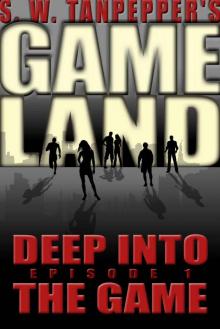 Deep Into the Game: S.W. Tanpepper's GAMELAND (Episode 1) (Volume 1) (S. W. Tanpepper's GAMELAND)
Deep Into the Game: S.W. Tanpepper's GAMELAND (Episode 1) (Volume 1) (S. W. Tanpepper's GAMELAND)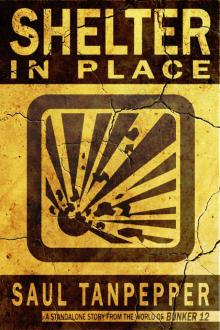 Shelter in Place: A short story from the world of BUNKER 12
Shelter in Place: A short story from the world of BUNKER 12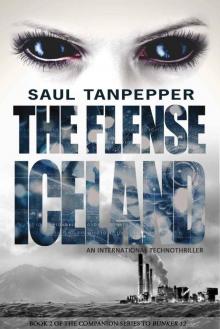 Iceland: An International Thriller (The Flense Book 2)
Iceland: An International Thriller (The Flense Book 2)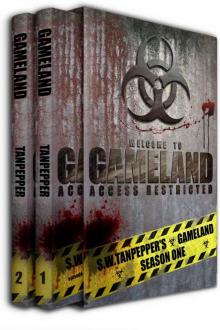 GAMELAND Episodes 1-2: Deep Into the Game + Failsafe (S. W. Tanpepper's GAMELAND)
GAMELAND Episodes 1-2: Deep Into the Game + Failsafe (S. W. Tanpepper's GAMELAND)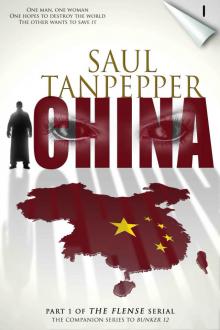 THE FLENSE: China: (Part 1 of THE FLENSE serial)
THE FLENSE: China: (Part 1 of THE FLENSE serial)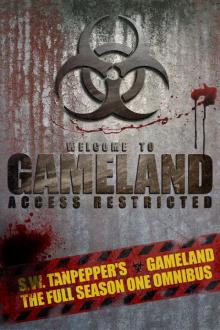 S.W. Tanpepper's GAMELAND, Season One Omnibus
S.W. Tanpepper's GAMELAND, Season One Omnibus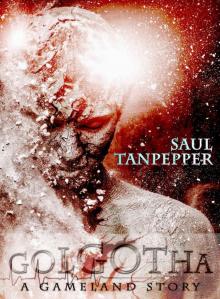 Golgotha: Prequel to S.W. Tanpepper's GAMELAND series (S. W. Tanpepper's GAMELAND companion title Book 1)
Golgotha: Prequel to S.W. Tanpepper's GAMELAND series (S. W. Tanpepper's GAMELAND companion title Book 1)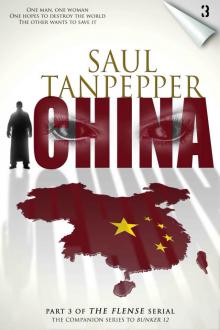 THE FLENSE: China: (Part 3 of THE FLENSE serial)
THE FLENSE: China: (Part 3 of THE FLENSE serial)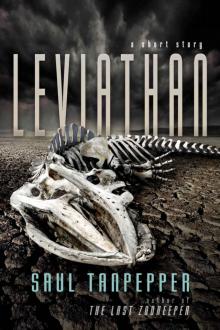 Leviathan: A Short Story About the End of the World
Leviathan: A Short Story About the End of the World Insomnia: Paranormal Tales, Science Fiction, & Horror
Insomnia: Paranormal Tales, Science Fiction, & Horror Velveteen
Velveteen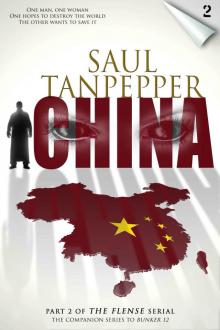 THE FLENSE: China: (Part 2 of THE FLENSE serial)
THE FLENSE: China: (Part 2 of THE FLENSE serial)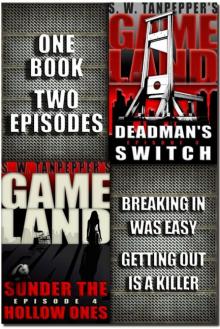 Deadman's Switch & Sunder the Hollow Ones
Deadman's Switch & Sunder the Hollow Ones